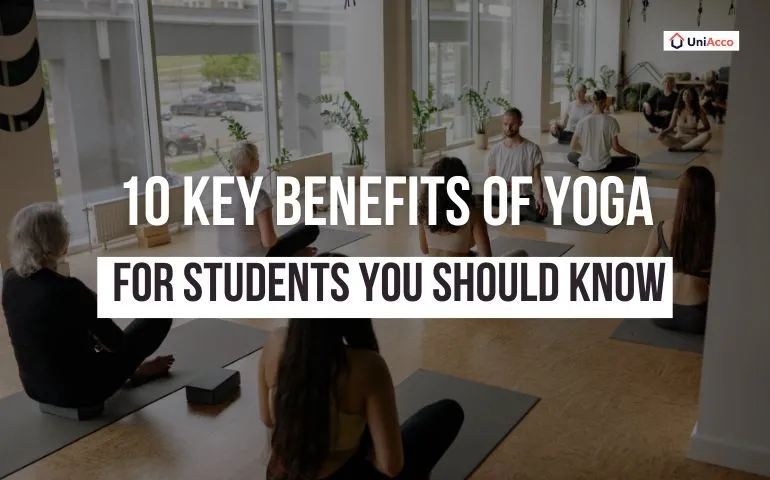Table of Contents
Studying abroad sounds exciting, until reality hits. Long lectures. Part-time jobs. Cultural shocks. A schedule so packed, you barely have time to breathe. Add to that the pressure to stay healthy, focused, and emotionally steady while you’re miles away from home. It’s a lot. And it’s easy to let your well-being slip through the cracks.
That’s exactly where yoga steps in, not as another thing to tick off your list, but as something that keeps you grounded when everything else feels unstable. The benefits of yoga for students aren’t just physical. They’re mental, emotional, and even academic.
It’s not about mastering handstands. It’s about having a simple, consistent practice that actually helps you think clearly, sleep better, and feel less overwhelmed. In this blog, we’ll explore 10 real, practical ways yoga can make your student life abroad a little easier and a lot more balanced.
10 Benefits of Yoga for Students While Studying Abroad
- Helps Manage Stress and Stay Calm Under Pressure
Studying abroad can wear you down. New routines, deadlines, culture shifts all build up. Yoga helps you slow that mental chaos. It clears your head and calms your nervous system. This is one of the most practical benefits of yoga for students: it reduces cortisol, improves sleep, and gives you breathing room.
Beginner Yoga Poses to Reduce Stress
- Child’s Pose – Relaxes your spine and nervous system.
- Legs-up-the-wall – Calms anxiety and improves blood flow.
- Easy Pose + Deep Breathing – Best for mental clarity.
- Cobra Pose – Opens the chest and eases tension.
Advanced Yoga & Breathwork to Manage Anxiety
- Surya Namaskar – Boosts energy and focus.
- Bridge Pose – Relieves lower back tension and improves mood.
- Camel Pose – Opens posture, lifts energy.
- Pranayama – Practice Anulom Vilom to balance your breath and your mind.
- Supports Heart Health by Keeping Blood Pressure in Check
When you study abroad, your body is normally put into constant alert mode. That stress raises blood pressure, quietly damaging your health. Yoga helps by activating your parasympathetic nervous system, the part that tells your body to chill out. With regular practice, your blood pressure drops naturally, easing strain on your heart and improving overall well-being.
Beginner Yoga Poses to Lower Blood Pressure
- Legs-up-the-wall – Reduces pressure in the legs and lowers heart rate.
- Supported Bridge Pose – Opens the chest and relaxes blood vessels.
- Seated Forward Bend – Calms the nervous system and eases tension.
Advanced Yoga & Breathwork to Manage Pressue
- Viparita Karani (Inverted Legs) – Encourages circulation and reduces blood pressure.
- Pranayama – Nadi Shodhana (Alternate Nostril Breathing) slows heart rate and calms blood pressure spikes.
- Sharpens Focus and Improves Memory for Exam Prep
When you’re juggling studies, deadlines, and a new environment, focus can vanish fast. Yoga trains your mind to stay present. It sharpens attention and clears mental clutter. That’s why the benefits of yoga for students go beyond the body. Your brain gets a real boost too.
Beginner Yoga Poses to Boost Concentration
- Easy Pose with Pranayama – Deep breathing sharpens your awareness.
- Tree Pose – Builds balance and mental steadiness.
- Seated Forward Bend – Calms your mind and reduces restlessness.
Advanced Yoga & Breathwork to Boost Concentration
- Surya Namaskar – Energises both body and brain.
- Eagle Pose (Garudasana) – Enhances focus and stability.
- Bhramari Pranayama – The humming breath calms anxiety and improves concentration.
- Boosts Confidence and Makes Social Interactions Easier
Moving abroad means building a whole new circle from scratch. That can feel overwhelming. Yoga helps you stay calm and grounded, which makes connecting with others easier. It encourages mindfulness, patience, and empathy, key ingredients for strong social bonds.
Beginner Yoga Poses to Better Social Ease
- Breath Awareness (Pranayama) – Helps reduce social anxiety.
- Mountain Pose (Tadasana) – Boosts confidence with grounded posture.
- Child’s Pose – Resets your mood after stressful interactions.
Advanced Yoga & Breathwork to Better Social Ease
- Partner Yoga – Builds trust and communication skills.
- Heart-Opening Poses (Camel, Bridge) – Physically opens your chest and emotionally opens you to others.
- Loving-Kindness Meditation (Metta) – Cultivates compassion and patience.
- Builds Habits That Support Long-Term Mental and Physical Health
Pursuing an international education is a phase, but your health lasts a lifetime. Yoga sets you up for lasting well-being. It builds habits that protect your body and mind well beyond exams and semesters. That’s why the importance of yoga for students can’t be overstated. It’s a foundation, not a quick fix.
Beginner Yoga Poses to Maintain Wellness
- Surya Namaskar – Energises and tones your whole body.
- Pranayama for students – Strengthens lungs and calms your mind.
- Shavasana – Teaches deep rest and recovery.
Advanced Yoga & Breathwork to Maintain Wellness
- Regular meditation to sharpen focus and reduce stress.
- Strength-building poses to support posture and prevent injury.
- Consistent breathwork for mental clarity and emotional balance.
- Keeps You Energised and Productive Through Long Study Days
Juggling classes, assignments, and social life can seem a lot at times. Staying productive is tough. Yoga helps by boosting your energy and clearing mental fog. When your mind’s clear, you work smarter, not harder. That’s a key benefit of yoga for students; it powers your focus and stamina through long days.
Beginner Yoga Poses to Boost Productivity
- Surya Namaskar – A full-body flow to wake you up.
- Cat-Cow Pose – Releases tension and improves circulation.
- Pranayama – Breath control sharpens your mind instantly.
Advanced Yoga & Breathwork to Boost Productivity
- Chair Pose (Utkatasana) – Builds strength and endurance.
- Plank Pose – Improves core and mental grit.
- Bhastrika Pranayama – The “bellows breath” energises body and mind.
- Promotes Deeper, More Restful Sleep Amid a Hectic Schedule
Adjusting to a new time zone and study schedule can wreck your sleep. At such times, yoga helps reset your body’s clock by calming your mind and easing tension. Better sleep means better focus and mood. This is a key benefit of yoga for students dealing with jet lag or late-night study stress.
Beginner Yoga Poses for Better Sleep
- Legs-up-the-wall – Relaxes your nervous system before bed.
- Seated Forward Bend – Soothes the mind and body.
- Deep Pranayama – Slow, deep breaths ease you into sleep.
Advanced Yoga & Breathwork for Better Sleep
- Yoga Nidra – A guided relaxation that resets your nervous system.
- Viparita Karani – Supports circulation and calm.
- Alternate Nostril Breathing (Nadi Shodhana) – Balances the nervous system for deep rest.
- Lifts Your Mood and Reduces Feelings of Isolation
Living abroad can get overwhelming when you’re constantly battling homesickness, pressure, and new challenges. Yoga lifts your mood by releasing feel-good chemicals in your brain. It helps you stay balanced, even on tough days. That’s why the benefits of yoga touch your emotional wellbeing too.
Beginner Yoga Poses to Boost Your Mood
- Sun Salutations (Surya Namaskar) – Energises and uplifts your spirit.
- Cat-Cow Pose – Relieves tension and refreshes your mind.
- Breath of Joy (Pranayama) – Quick breathwork to spark positivity.
Advanced Yoga & Breathwork to Boost Your Mood
- Heart-Opening Poses (Camel, Bridge) – Open your chest and release emotional blockages.
- Loving-Kindness Meditation – Cultivates kindness toward yourself and others.
- Kapalabhati Pranayama – Clears mental fog and boosts energy.
- Corrects Posture from Long Hours of Studying or Screen Time
Long hours of studying, typing, or carrying backpacks can hamper your posture. Bad posture leads to aches and strains that distract you from your goals. Yoga strengthens your core and back muscles, helping you stand tall and move with ease. Practising yoga keeps your body aligned, reducing pain and boosting confidence.
Beginner Yoga Poses for Better Posture
- Mountain Pose (Tadasana) – Teaches you how to stand straight.
- Cat-Cow Pose – Mobilises your spine and releases tension.
- Cobra Pose (Bhujangasana) – Opens your chest and strengthens your back.
Advanced Yoga & Breathwork for Better Posture
- Plank Pose – Builds core power to support your spine.
- Bridge Pose (Setu Bandhasana) – Strengthens back muscles and improves posture.
- Warrior II Pose (Virabhadrasana II) – Enhances balance and body awareness.
- Teaches Discipline and Builds Better Self-Control Over Time
You’re thrown into new situations every day from temptations, distractions, and challenges popping up everywhere. Yoga trains your mind and body to stay calm and disciplined. It strengthens your willpower and helps you make better choices. That’s a huge part of the benefits of yoga for students—it’s about mastering yourself amid chaos.
Beginner Yoga Poses to Boost Self-Control
- Breath Awareness (Pranayama) – Controls impulses by tuning your mind to your breath.
- Seated Meditation – Teaches patience and mental stillness.
- Chair Pose (Utkatasana) – Builds physical endurance and mental grit.
Advanced Yoga & Breathwork to Boost Self-Control
- Advanced Pranayama (Kapalabhati) – Clears mental fog and sharpens control.
- Balance Poses (Tree Pose, Eagle Pose) – Improve concentration and steady the mind.
- Yoga Nidra – Deep mental reset to boost self-discipline.
Tips to Incorporate Yoga in Your Daily Routine
- Start Small and Build Consistency
You don’t need an hour-long session every day. Just 10–15 minutes of focused yoga daily can deliver powerful benefits of yoga for students. The key is to make it a habit, not a chore. Consistency beats intensity, so keep it simple and stick with it.
- Make Surya Namaskar Your Morning Boost
Surya Namaskar benefits for students go beyond a physical workout; it wakes up your body and sharpens your mind. Doing this sequence every morning sets a positive tone for your day, helping you handle study pressure and unfamiliar surroundings. It’s an energiser and a reset button combined.
- Focus on Breath Control with Pranayama
Pranayama for students is like a natural stress-relief tool. Spending 5 minutes practising deep, controlled breathing can reduce anxiety, improve concentration, and balance your mood. You can do this anywhere, even between classes or before exams to regain calm and focus.
- Create a Dedicated Space and Routine
Find a quiet corner or a spot where you feel comfortable. Making this your yoga space creates a mental cue for relaxation and focus. Having a routine, like practising at the same time daily, helps your mind and body expect and prepare for the session.
- Blend Simple and Challenging Poses
Mix beginner-friendly stretches with more advanced poses as you progress. This balance keeps your routine interesting and evenly strengthens your body. It also prevents boredom and supports the importance of yoga for students by improving flexibility, strength, and posture.
- Use Yoga Breaks to Recharge During Studies
Studying abroad means long hours and often stress. Taking short yoga breaks helps you clear mental fatigue and reset your energy. Simple stretches or breathing exercises between study sessions improve productivity and reduce burnout.
- Listen to Your Body and Adjust
Yoga isn’t about pushing limits. Paying attention to your body helps you avoid injury and enjoy lasting benefits. Adjust poses or take rest when needed, which is key to sustaining your yoga practice abroad.
- Track Your Progress and Celebrate Wins
Keep a simple journal or note your improvements. Tracking progress helps you see real benefits of yoga for students over time and keeps motivation high. Celebrate small wins like better sleep or less stress—it fuels your commitment.
Wrapping Up!
Studying abroad tests you in ways you never expected. The benefits of yoga for students aren’t just about physical health. They’re about building quiet strength in your mind and emotions. Yoga helps you manage stress, improve focus, and sleep better, even when everything feels overwhelming. It’s a simple practice that keeps you balanced, steady, and ready to face whatever comes next.
And while you’re taking care of your mind and body, why not secure a peaceful place to call home? UniAcco offers student accommodation designed to support your well-being, giving you the calm and comfort you need to thrive abroad.
FAQs
- How does yoga help students perform better academically?
One of the key benefits of yoga for students is improved academic performance. A regular yoga practice helps lower stress levels, improve concentration, and boost memory. This mental clarity makes it easier to retain information, manage study pressure, and perform better in exams.
- Which yoga poses are best for students during exam season?
Certain poses and techniques are especially helpful during high-stress study periods. Surya Namaskar benefits for students include better blood circulation, reduced fatigue, and enhanced mental alertness. Combine this with poses like Tree Pose (Vrikshasana), Mountain Pose (Tadasana), and calming breathwork like Bhramari Pranayama for students, and you’ll find it easier to concentrate, stay energised, and avoid burnout.
- Can yoga improve focus and concentration for students?
Absolutely. One major benefit of yoga for students is its ability to sharpen focus. Through mindful movement, controlled breathing, and moments of stillness, yoga calms mental clutter and increases attention span. Practising yoga regularly helps your brain process information more clearly, making studying and retaining complex topics easier, especially when you’re far from home and juggling multiple tasks.
- Why is yoga important for students living abroad?
The importance of yoga for students studying abroad goes beyond physical fitness. Yoga offers emotional stability, reduces feelings of isolation, and helps manage cultural stress. It gives you a daily routine that restores balance even when you’re juggling classes, part-time work, and homesickness.
- What are the mental health benefits of pranayama for students?
Pranayama for students is a powerful tool to manage anxiety, especially during academic pressure or adjustment phases abroad. Deep breathing techniques like Anulom Vilom and Bhramari calm your nervous system, reduce cortisol levels, and clear mental fog. They don’t take long, require no equipment, and help you feel in control, whether you’re prepping for an exam or dealing with daily stress.










0 Comments